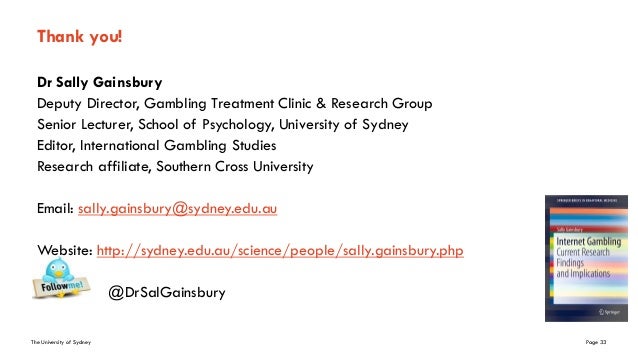Sydney University Gambling Treatment Clinic
I am an Associate Professor within the School of Psychology and Co- Director of the Gambling Treatment and Research Clinic in the Brain and Mind Centre at the University of Sydney. I am the Editor. The Gambling Treatment and Research Clinic at the University of Sydney’s Brain and Mind Centre would like to extend to you an invite to the next in our series of Journal Club Webinars of 2020, to be held at 9:30am on Thursday 20th August. The Gambling Treatment and Research Clinic offers free, confidential services for individuals and families impacted by gambling with no referral needed, funded by the NSW Office of Responsible Gambling. Clients are currently being seen remotely using telephone and video conferencing. The Gambling Treatment Clinic at the University of Sydney's Brain and Mind Centre is a free and confidential service for gamblers and their family members. Call us on 1800 482 482 to book in. Our clinics are in discreet and easily accessible locations, and we now offer online and phone sessions for those who require it.
Sydney University Gambling Treatment Clinical
Aussie researchers say it is not…and they have a better treatment for it Academic researchers at the University of Sydney's Gambling Treatment Clinic in Australia say that gambling is not necessarily the addiction that many believe it to be.

In a press release the clinic’s Education and Training Officer, Dr Fadi Anjoul, who has treated problem gamblers for the past 15 years, says: “The idea of gambling addiction is widespread, but inaccurate.”
Dr Anjoul notes that problem gambling has been consistently grouped with drug and alcohol addiction, but points out that symptoms such as tolerance or withdrawal, which are central features of addiction, are rarely seen in gamblers.
“Problem gambling is better thought of as a misguided obsession,” Dr Anjoul opines, “which means we are dealing with habitual and poorly informed choices rather than biological processes that are beyond individual control.”
The difference has important implications for treatment. Poorly informed choices and behaviors can be treated with what is known as cognitive therapy, which helps people understand the story of their gambling, of how they ended up where they are, and to change how they think about their involvement with gambling.
Dr Anjoul has developed an innovative process of cognitive therapy that generally results in significantly better outcomes than traditional therapies based on the disease or addiction model of gambling.

“Traditional therapies tend to focus on ways to help people deal with their urges when they occur,” says Dr Anjoul, “and show high rates of relapse after therapy ends. However, with the model we are working with, we often find that by the end of treatment, people are experiencing very few urges to gamble.”
Professor Alex Blaszczynski, head of the University’s School of Psychology and an oft-quoted expert on problem gambling, says: “The results we are getting so far at the Gambling Treatment Clinic with the new cognitive therapy are extremely exciting.
Sydney Uni Gambling Treatment Clinic
“It is early days but at this point it appears we are seeing better treatment outcomes and much lower relapse rates than have been found elsewhere.”
Sydney University Gambling Treatment Clinical Psychology
Check Out These Other Great Online Casinos
Gambling Treatment Clinic - University Of Sydney Parramatta Nsw
| $3000 Bonus Poker and Casino Bitcoin Friendly Fastest Paying Visit Bovada | 250 Free Spins No Id or Fax Back Forms Anonymous Instant Payouts Visit Fortune Jack | $25 No Deposit Bonus Bitcoin Welcome Sports, Poker and Casino Fast Paying Visit BetOnline |
